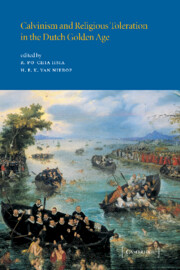Book contents
- Frontmatter
- Contents
- Notes on contributors
- 1 Introduction
- 2 ‘Dutch’ religious tolerance: celebration and revision
- 3 Religious toleration in the United Provinces: from ‘case’ to ‘model’
- 4 The bond of Christian piety: the individual practice of tolerance and intolerance in the Dutch Republic
- 5 Religious policies in the seventeenth-century Dutch Republic
- 6 Paying off the sheriff: strategies of Catholic toleration in Golden Age Holland
- 7 Sewing the bailiff in a blanket: Catholics and the law in Holland
- 8 Anabaptism and tolerance: possibilities and limitations
- 9 Jews and religious toleration in the Dutch Republic
- 10 Religious toleration and radical philosophy in the later Dutch Golden Age (1668–1710)
- 11 The politics of intolerance: citizenship and religion in the Dutch Republic (seventeenth to eighteenth centuries)
- Select bibliography
- Index
10 - Religious toleration and radical philosophy in the later Dutch Golden Age (1668–1710)
Published online by Cambridge University Press: 08 July 2009
- Frontmatter
- Contents
- Notes on contributors
- 1 Introduction
- 2 ‘Dutch’ religious tolerance: celebration and revision
- 3 Religious toleration in the United Provinces: from ‘case’ to ‘model’
- 4 The bond of Christian piety: the individual practice of tolerance and intolerance in the Dutch Republic
- 5 Religious policies in the seventeenth-century Dutch Republic
- 6 Paying off the sheriff: strategies of Catholic toleration in Golden Age Holland
- 7 Sewing the bailiff in a blanket: Catholics and the law in Holland
- 8 Anabaptism and tolerance: possibilities and limitations
- 9 Jews and religious toleration in the Dutch Republic
- 10 Religious toleration and radical philosophy in the later Dutch Golden Age (1668–1710)
- 11 The politics of intolerance: citizenship and religion in the Dutch Republic (seventeenth to eighteenth centuries)
- Select bibliography
- Index
Summary
In the preface to Spinoza's Tractatus Theologico-Politicus (1670) there is to be found a famous passage celebrating the toleration and freedom of thought prevailing in Holland during the age of De Witt:
Now since we have the rare good fortune to live in a commonwealth where freedom of judgement is fully granted to the individual citizen and he may worship God as he pleases, and where nothing is esteemed dearer and more precious than freedom (ubi unicuique judicandi libertas integra, et Deum exsuo ingenio colere conceditur, et ubi nihil libertate charius, nec dulcius habetur) I think I am undertaking no ungrateful or unprofitable task in demonstrating that not only can this freedom be granted without endangering piety and the peace of the commonwealth, but also that the peace of the commonwealth and piety depend on this freedom.
The passage is intriguing from several points of view. Sometimes it has been taken at face value, along with Spinoza's positive comments about Amsterdam ‘which enjoys the fruits of this freedom’, in the final chapter of the Tractatus, a grateful eulogy extolling a religious toleration paralleled at the time scarcely anywhere in Europe. A second way of interpreting the passage is to see it as a response to the spate of recent repressive measures on the part of the civic governments to suppress the upsurge of radical ideas which was so striking a feature of the late 1660s in the Dutch Republic.
- Type
- Chapter
- Information
- Calvinism and Religious Toleration in the Dutch Golden Age , pp. 148 - 158Publisher: Cambridge University PressPrint publication year: 2002



